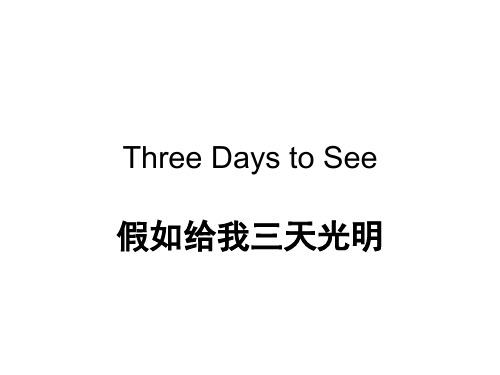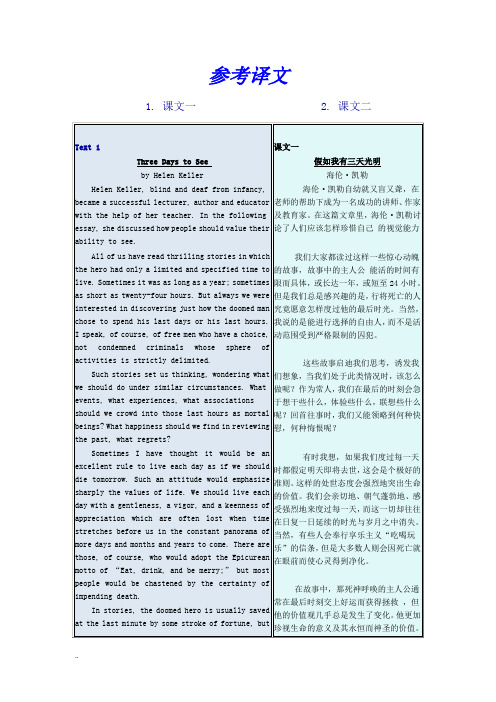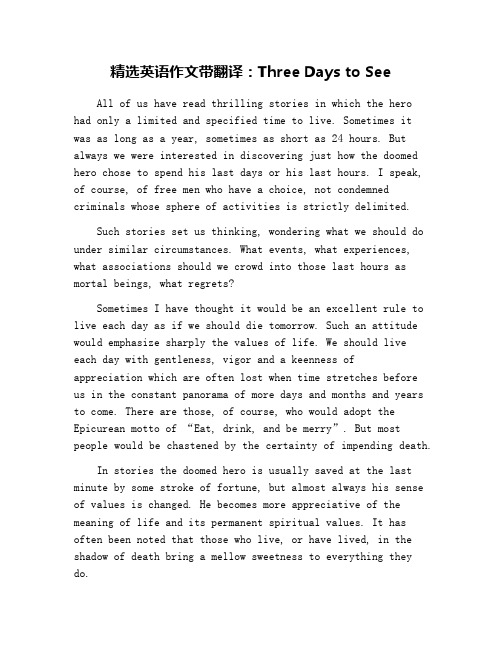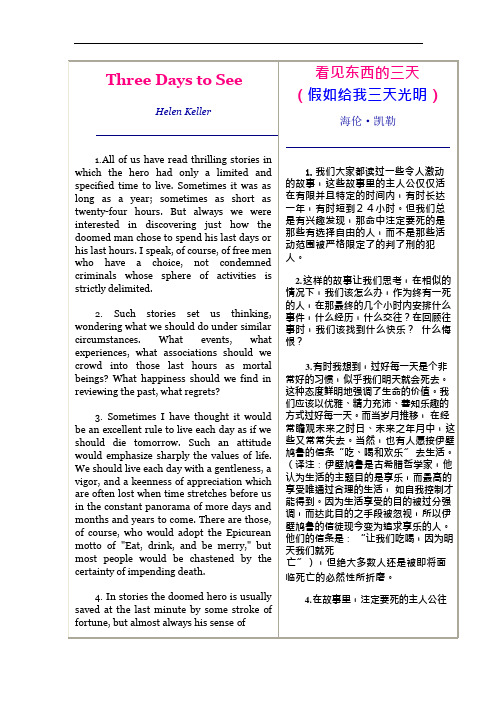中英对照美文-2-3days to see
英语故事-Three Days to See

英语故事Three Days to See把每天都当作生命的最后一天来度过也不失为一个很好的生命法则。
这种人生态度会使人非常重视人生的价值。
Three Days to See节选自海伦·凯勒《假如给我三天光明》All of us have read thrilling stories in which the hero had only a limited and specified time to live. Sometimes it was as long as a year; sometimes as short as twenty-four hours, but always we were interested in discovering just how the doomed man chose to spend his last days or his last hours. I speak, of course, of free men who have a choice, not condemned criminals whose sphere of activities is strictly delimited.Such stories set us thinking, wondering what we should do under similar circumstances. What associations should we crowd into those last hours as mortal beings? What happiness should we find in reviewing the past, what regrets?Sometimes I have thought it would be an excellent rule to live each day as if we should die tomorrow. Such an attitude would emphasize sharply the values of life. We should live each day with a gentleness, a vigor, and a keenness of appreciation which are often lost when time stretches before us in the constant panorama of more days and months and years to come. There are those, of course, who would adopt the epicurean motto of “Eat, drink, and be merry,” but most people would be chastened by the certainty of impending death.Most of us take life for granted. We know that one daywe must die, but usually we picture that day as far in the future, when we are in buoyant health, death is all but unimaginable. We seldom think of it. The days stretch out in an endless vista. So we go about our petty task, hardly aware of our listless attitude towards life.The same lethargy, I am afraid, characterizes the use of all our faculties and senses. Only the deaf appreciate hearing, only the blind realize the manifold blessings that lie in sight. Particularly does this observation apply to those who have lost sight and hearing in adult life. But those who have never suffered impairment of sight or hearing seldom make the fullest use of these blessed faculties. Their eyes and ears take in all sights and sound hazily, without concentration, and with little appreciation. It is the same old story of not being grateful for what we conscious of health until we are ill.I have often thought it would be a blessing if each human being were stricken blind and deaf for a few days at some time during his early adult life. Darkness would make him more appreciative of sight; silence would teach him the joys of sound.Now and then I have tested my seeing friends to discover what they see. Recently I was visited by a very good friend who had just returned from a long walk in the woods, and I asked her what she had observed. “Nothing in particular,”she replied. I might have been incredulous had I not been accustomed to such responses, for long ago I became convinced that the seeing see little.How was it possible, I asked myself, to walk for an hour through the woods and see nothing worthy of note? I who cannot see find hundreds of things to interest me through mere touch.I feel the delicate symmetry of a leaf. I pass my hands lovinglyabout the smooth skin of a silver birch, or the rough shaggy bark of a pine. In spring I touch the branches of trees hopefully in search of a bud, the first sign of awakening Nature after her winter’s sleep. I feel the delightful, velvety texture of a flower, and discover its remarkable convolutions; and something of the miracle of Nature is revealed to me. Occasionally, if I am very fortunate, I place my hand gently in a small tree and feel the happy quiver of a bird in full song. I am delighted to have the cool waters of a brook rush through my open fingers. To me a lush carpet of pine needles or spongy grass is more welcome than the most luxurious Persian rug. To me the pageant of seasons is a thrilling and unending drama, the action of which streams through my finger tips. At times my heart cries out with longing to see all these things. If I can get so much pleasure from mere touch, how much more beauty must be revealed by sight. Yet, those who have eyes apparently see little. The panorama of color and action fill the world is taken for granted. It is human, perhaps, to appreciate little that which we have and to long for that which we have not, but it is a great pity that in the world of light and the gift of sight is used only as a mere convenience rather than as a means of adding fullness to life.Oh, the things that I should see if I had the power of sight for three days!。
threedaystosee中英文对照

Sometimes I have thought it would be an excellent rule to live each day as if we should die tomorrow. Such an attitude would emphasize sharply the values of life. We should live each day with a gentleness, a vigor, and a keenness of appreciation which are often lost when time stretches before us in the constant panorama of more days and months and years to come. There are those, of course, who would adopt the Epicurean motto of "Eat, drink, and be merry," but most people would be chastened by the certainty of impending death.
在故事里,注定要死的主人公往往在最后一刻由某 种命运的突变而得救,但几乎总是他的价值观被 改变了。他们对生活的意义和它永恒的精神价值 变得更具欣赏力了。常常看到那些生活或已生活 在死亡的阴影之中的人们都赋予他们所做的每件 事以芳醇甜美。
Most of us, however, take life for granted. We know that one day we must die, but usually we picture that day as far in the future. When we are in buoyant health, death is all but unimaginable. We seldom think of it. The days stretch out in an endless vista. So we go about our petty tasks, hardly aware of our listless attitude toward life.
大学英语作文:ThreeDaystoSee

大学英语作文:Three Days to See大学英语作文:Three Days to See在平凡的学习、工作、生活中,大家都经常接触到作文吧,借助作文人们可以实现文化交流的目的。
那么一般作文是怎么写的'呢?下面是小编精心整理的大学英语作文:Three Days to See,希望能够帮助到大家。
suppose you set your mind to work on the problem of how you would use your own eyes if you had three more days to see. if with the oncoming darkness of the third night you knew that the sun would never rise for you again, how would you spend those three precious intervening days? what would you most want to let your gaze rest upon?i, naturally, should want most to see the things which have become dear to me through my years of darkness. you, too, would want to let your eyes rest long on the things that have become dear to you so that you could take the memory of them with you in the night that loomed before you.i should want to see the people whose kindness and gentleness and companionship have made my life worth living. first i should like to gaze long upon the face of my teacher, mrs. anne sullivan macy, who came to me when i was a child and opened the outer world to me. i should want not merely the outline of her face, so that i could cherish it in my memory, but to study that face and find in it the living evidence of the sympathetic tenderness and patience with which she accomplished the difficult task of my education. i should like to see in her eyes that strength of character which has enabled her to stand firm in the face of difficulties, and that compassion for all humanity which she has revealed to me so often.oh, the things that i should see if i had the power of sight for just three days!。
Three-days-to-See-英文翻译

参考译文1. 课文一2. 课文二worthy of note? I who cannot see find hundreds of things to interest me through mere touch. I feel the delicate symmetry of a leaf. I pass my hands lovingly about the smooth skin of a silver birch, or the rough shaggy bark of a pine. In spring I touch the branches of trees hopefully in search of a bud, the first sign of awakening Nature after her winter's sleep. I feel the delightful, velvety texture of a flower, and discover its remarkable convolutions; and something of the miracle of Nature is revealed to me. Occasionally, if I am very fortunate, I place my hand gently on a small tree and feel the happy quiver of a bird in full song. I am delighted to have the cool water of a brook rush through my open fingers. To me a lush carpet of pine needles or spongy grass is more welcome than the most luxurious Persian rug. To me the pageant of seasons is a thrilling and unending drama, the action of which streams through my finger tips.At times my heart cries out with longing to see all these things. If I can get so much pleasure from mere touch, how much more beauty must be revealed by sight. Yet, those who have eyes apparently see little. The panorama of colour and action which fills the world is taken for granted. It is human, perhaps, to appreciate little that which we have and to long for that which we have not, but it is a great pity that in the world of light the gift of sight is used only as a mere convenience rather than as a means of adding fullness to life.If I were the president of a university I should establish a compulsory course in “How to Use Your Eyes”. The professor would try to show his pupils how they could add joy to their lives by really seeing what passes unnoticed before them. He would try to awake their dormant and sluggish faculties.Suppose you set your mind to work on the problem of how you would use your own eyes if you had only three more days to see. If with the oncoming darkness of the third night you knew that the sun would never rise for you again, how would 我问自己,在林中溜达了一个小时而竟未看到什么值得注意的东西,这怎么可能呢?我这个看不见东西的人,仅凭触摸就发现千百种使我感兴趣的东西。
精选英语作文带翻译:Three Days to See

精选英语作文带翻译:Three Days to SeeAll of us have read thrilling stories in which the hero had only a limited and specified time to live. Sometimes it was as long as a year, sometimes as short as 24 hours. But always we were interested in discovering just how the doomed hero chose to spend his last days or his last hours. I speak, of course, of free men who have a choice, not condemned criminals whose sphere of activities is strictly delimited.Such stories set us thinking, wondering what we should do under similar circumstances. What events, what experiences, what associations should we crowd into those last hours as mortal beings, what regrets?Sometimes I have thought it would be an excellent rule to live each day as if we should die tomorrow. Such an attitude would emphasize sharply the values of life. We should live each day with gentleness, vigor and a keenness ofappreciation which are often lost when time stretches before us in the constant panorama of more days and months and years to come. There are those, of course, who would adopt the Epicurean motto of “Eat, drink, and be merry”. But most people would be chastened by the certainty of impending death.In stories the doomed hero is usually saved at the last minute by some stroke of fortune, but almost always his sense of values is changed. He becomes more appreciative of the meaning of life and its permanent spiritual values. It has often been noted that those who live, or have lived, in the shadow of death bring a mellow sweetness to everything they do.Most of us, however, take life for granted. We know that one day we must die, but usually we picture that day as farin the future. When we are in buoyant health, death is all but unimaginable. We seldom think of it. The days stretch out in an endless vista. So we go about our petty tasks, hardly aware of our listless attitude toward life.The same lethargy, I am afraid, characterizes the use of all our faculties and senses. Only the deaf appreciate hearing, only the blind realize the manifold blessings that lie in sight. Particularly does this observation apply to those who have lost sight and hearing in adult life. But those who have never suffered impairment of sight or hearing seldom make the fullest use of these blessed faculties. Their eyes and ears take in all sights and sounds hazily, without concentration and with little appreciation. It is the same old story of not being grateful for what we have until we lose it, of not being conscious of health until we are ill.I have often thought it would be a blessing if each human being were stricken blind and deaf for a few days at some time during his early adult life. Darkness would make him more appreciative of sight; silence would teach him the joys of sound.我们都读过震撼人心的故事,故事中的主人公只能在有限并且特定的生存时间。
Three days to See 英文翻译

参考译文1. 课文一2. 课文二worthy of note? I who cannot see find hundreds of things to interest me through mere touch. I feel the delicate symmetry of a leaf. I pass my hands lovingly about the smooth skin of a silver birch, or the rough shaggy bark of a pine. In spring I touch the branches of trees hopefully in search of a bud, the first sign of awakening Nature after her winter's sleep. I feel the delightful, velvety texture of a flower, and discover its remarkable convolutions; and something of the miracle of Nature is revealed to me. Occasionally, if I am very fortunate, I place my hand gently on a small tree and feel the happy quiver of a bird in full song. I am delighted to have the cool water of a brook rush through my open fingers. To me a lush carpet of pine needles or spongy grass is more welcome than the most luxurious Persian rug. To me the pageant of seasons is a thrilling and unending drama, the action of which streams through my finger tips.At times my heart cries out with longing to see all these things. If I can get so much pleasure from mere touch, how much more beauty must be revealed by sight. Yet, those who have eyes apparently see little. The panorama of colour and action which fills the world is taken for granted. It is human, perhaps, to appreciate little that which we have and to long for that which we have not, but it is a great pity that in the world of light the gift of sight is used only as a mere convenience rather than as a means of adding fullness to life.If I were the president of a university I should establish a compulsory course in “How to Use Your Eyes”. The professor would try to show his pupils how they could add joy to their lives by really seeing what passes unnoticed before them. He would try to awake their dormant and sluggish faculties.Suppose you set your mind to work on the problem of how you would use your own eyes if you had only three more days to see. If with the oncoming darkness of the third night you knew that the sun would never rise for you again, how would 我问自己,在林中溜达了一个小时而竟未看到什么值得注意的东西,这怎么可能呢?我这个看不见东西的人,仅凭触摸就发现千百种使我感兴趣的东西。
Three Days to See-中英文

Three Days to SeeHelen Keller1.All of us have read thrilling stories in which the hero had only a limited and specified time to live. Sometimes it was as long as a year; sometimes as short as twenty-four hours. But always we were interested in discovering just how the doomed man chose to spend his last days or his last hours. I speak, of course, of free men who have a choice, not condemned criminals whose sphere of activities is strictly delimited.2. Such stories set us thinking, wondering what we should do under similar circumstances. What events, what experiences, what associations should we crowd into those last hours as mortal beings? What happiness should we find in reviewing the past, what regrets?3. Sometimes I have thought it would be an excellent rule to live each day as if we should die tomorrow. Such an attitude would emphasize sharply the values of life. We should live each day with a gentleness, a vigor, and a keenness of appreciation which are often lost when time stretches before usin the constant panorama of more days and months and years to come. There are those,of course, who would adopt the Epicurean motto of "Eat, drink, and be merry," but most people would be chastened by the certainty of impending death.4. In stories the doomed hero is usually saved at the last minute by some stroke of fortune, but almost always his sense of看见东西的三天 (假如给我三天光明)海伦·凯勒1.我们大家都读过一些令人激动的故事,这些故事里的主人公仅仅活在有限并且特定的时间内,有时长达一年,有时短到24小时。
Three-Days-to-See-中英文

ahead. You would use your eyes as never before. Everything you saw would become dear to you. Your eyes would touch and embrace every object that came within your range of vision. Then, at last, you would really see, and a new world of beauty would open itself before you.51. I who am blind can give one hint to those who see -- one admonition to those who would make full use of the gift of sight: Use your eyes as if tomorrow you would be stricken blind. And the same method can be applied to the other senses. Hear the music of voices, the song of a bird, the mighty strains of an orchestra, as if you would be stricken deaf tomorrow. Touch each object you want to touch as if tomorrow your tactile sense would fail. Smell the perfume of flowers, taste with relish each morsel, as if tomorrow you could never smell and taste again. Make the most of every sense: glory in all the facets of pleasure and beauty which the world reveals to you through the several means of contact which Nature provides. But of all the senses, I am sure that sight must be the most delightful.。
- 1、下载文档前请自行甄别文档内容的完整性,平台不提供额外的编辑、内容补充、找答案等附加服务。
- 2、"仅部分预览"的文档,不可在线预览部分如存在完整性等问题,可反馈申请退款(可完整预览的文档不适用该条件!)。
- 3、如文档侵犯您的权益,请联系客服反馈,我们会尽快为您处理(人工客服工作时间:9:00-18:30)。
请给我三天光明
All of us have read thrilling stories in which the hero had only a limited and specified time to live. Sometimes it was as long as a year, sometimes as short as 24 hours. But always we were interested in discovering just how the doomed man chose to spend his last days or his last hours.
I speak, of course, of free men who have a choice, not condemned criminals whose sphere of activities is strictly delimited.
我们大家都读过一些令人激动的故事,这些故事里的主人公仅仅拥有非常短的时间可以继续维持生命,有时长达一年,有时短到24小时。
我们总是对此感兴趣,那命中注定快要死了的人,将如何打发他最后的时间。
当然,我们指的是那些有行动选择权的人,而不是那些活动范围被严格限定了的判了刑的犯人。
Such stories set us thinking, wondering what we should do under similar circumstances. What events, what experiences, what associations should we crowd into those last hours as mortal beings? What happiness should we find in reviewing the past, what regrets?
这样的故事让我们思考,在相似的情况下,我们该怎么办,作为即将要死的人,在那最终的几个小时内,应该安排活动,体验什么经历,发起什么交往?在回顾往事时,哪些真正带给了我们快乐?哪些引起了我们的悔恨?
Sometimes I have thought it would be an excellent rule to live each day as if we should die tomorrow. Such an attitude would emphasize sharply the values of life. We should live each day with a gentleness, a vigor, and a keenness of appreciation which are often lost when time stretches before us in the constant panorama of more days and months and years to come. There are those, of course, who would adopt the Epicurean motto of “Eat, drink, and be merry,“ but most people would be chastened by the certainty of impending death.
有时我想,如果你把自己的每一天都当作最后一天,你的生活体验一定非常卓越。
因为这种态度可以最大限度地强调生命的价值。
我们每天都应该以优雅、精力充沛、充满感恩的心情去度过,而非漠视时光流转,总觉得来日方长。
当然,也有人希望愿按伊壁鸠鲁的信条“吃好、喝好、享受欢乐”的方式去生活(译注:伊壁鸠鲁是古希腊哲学家,他认为生活的主题目的是享乐,而最高的享受唯通过合理的生活,如自我控制才能得到。
因为生活享受的目的被过分强调,而达此目的之手段被忽视,所以伊壁鸠鲁的信徒现今变为追求享乐的人。
他们的信条是:“让我们吃喝,因为明天我们就死亡”),但绝大多数人还是惧怕即将面临死亡。
In stories the doomed hero is usually saved at the last minute by some stroke of fortune, but almost always his sense of values is changed. He becomes more appreciative of the meaning of life and its permanent spiritual values. It has often been noted that those who live, or have lived, in the shadow of death bring a mellow sweetness to everything they do.
在故事里,那些面对死亡的英雄往往在最后一刻由某种命运的突变而得救,他的价值观也总是因此发生了变化。
他们拥有了对生活的意义和精神价值的欣赏力。
常常看到那些在死亡阴影下活过来的人们,都沉浸于他们所要做的每一件事,似乎所有要做的事情都充满芳醇甜美。
Most of us, however, take life for granted. We know that one day we must die, but usually we picture that day as far in the future. When we are in buoyant health, death is all but unimaginable. We seldom think of it. The days stretch out in an endless vista. So we go about our
petty tasks, hardly aware of our listless attitude toward life.
但是,我们大多数人把活着看成理所当然的。
其实我们也知道,某一天我们一定会死,但通常我们把那一天想象得很遥远,很遥远。
当我们体健如牛时,想象死亡是那么滑稽,好像时光会永远属于你。
于是我们干着无聊的琐事,几乎意识不到我们对生活的态度是如此倦怠。
The same lethargy, I am afraid, characterizes the use of all our faculties and senses. Only the deaf appreciate hearing, only the blind realize the manifold blessings that lie in sight. Particularly does this observation apply to those who have lost sight and hearing in adult life. But those who have never suffered impairment of sight or hearing seldom make the fullest use of these blessed faculties. Their eyes and ears take in all sights and sounds hazily, without concentration and with little appreciation. It is the same old story of not being grateful for what we have until we lose it, of not being conscious of health until we are ill.
恐怕,我们一直在这样的懒散中消耗我们所拥有的本能。
只有聋子才强烈期盼获得听的能力,唯有盲人才能体会到看见东西时的幸福。
尤其对于后天失去听力或视力的人,这种体验会更深刻。
而那些从没有遭受视觉或听觉损伤之苦的人,很少会充分利用这些天赐的官能。
他们眼观六路耳听八方,却毫无重点,不懂鉴赏。
还是那同样的老话,失去了才知道珍惜。
I have often thought it would be a blessing if each human being were stricken blind and deaf for
a few days at some time during his early adult life. Darkness would make him more appreciative of sight; silence would teach him the joys of sound.
我常常想,如果每个人在他步入成年的早期都经历一小段看不见听不着的生活,对他一生一定大有裨益。
黑暗会使他更珍惜自己的视力,寂静会教导他去享受声音之美。
